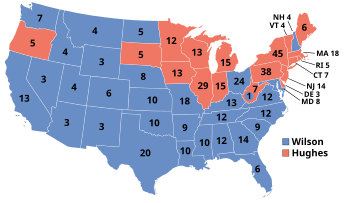U.S. presidential election, 1916
|
|
|||||||||||||||||||||||||||||
|---|---|---|---|---|---|---|---|---|---|---|---|---|---|---|---|---|---|---|---|---|---|---|---|---|---|---|---|---|---|
|
|||||||||||||||||||||||||||||
|
531 electoral votes of the Electoral College 266 electoral votes needed to win |
|||||||||||||||||||||||||||||
| Turnout | 61.6% |
||||||||||||||||||||||||||||
|
|||||||||||||||||||||||||||||
|
Presidential election results map. Blue denotes those won by Wilson/Marshall, red denotes states won by Hughes/Fairbanks. Numbers indicate the number of electoral votes allotted to each state.
|
|||||||||||||||||||||||||||||
|
|||||||||||||||||||||||||||||
The United States presidential election of 1916 was the 33rd quadrennial presidential election, held on Tuesday, November 7, 1916. Incumbent President Woodrow Wilson, the Democratic candidate, was pitted against Supreme Court Justice Charles Evans Hughes, the Republican candidate. After a hard-fought contest, Wilson defeated Hughes by nearly 600,000 votes in the popular vote and secured a narrow majority in the Electoral College by winning several swing states with razor-thin margins. Wilson's re-election marked the first time that a Democratic Party candidate had won two consecutive Presidential elections since Andrew Jackson won re-election in the 1832 election. This was the last election before the ratification of the Nineteenth Amendment to the United States Constitution, which granted women the right to vote.
The election took place during the time of the Mexican Revolution and Europe's involvement in World War I. Although officially neutral in the European conflict, public opinion in the United States leaned towards the Allied forces headed by Great Britain and France against the German Empire and Austria-Hungary, due in large measure to the harsh treatment of civilians by the German Army in Belgium and northern France and the militaristic character of the German and Austrian monarchies. But in spite of their sympathy with the Allied forces, most American voters wanted to avoid involvement in the war and preferred to continue a policy of neutrality. Wilson's campaign used the popular slogans "He kept us out of war" and "America First" to appeal to those voters who wanted to avoid a war in Europe or with Mexico. The progressive Hughes criticized Wilson for not taking the "necessary preparations" to face a conflict, which only served to strengthen Wilson's image as an anti-war candidate. America entered the war in April 1917, one month after Wilson's inauguration as president.
...
Wikipedia




